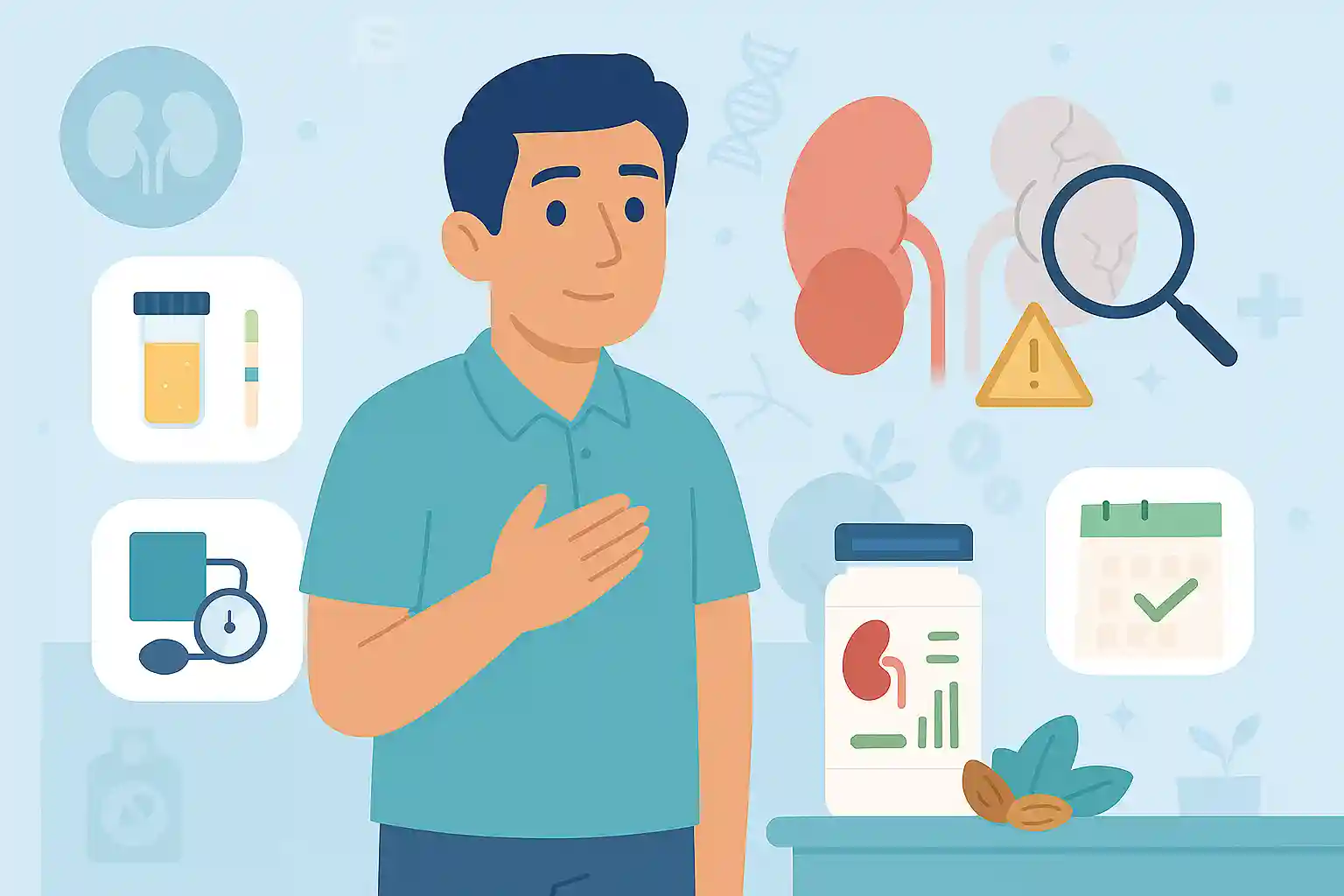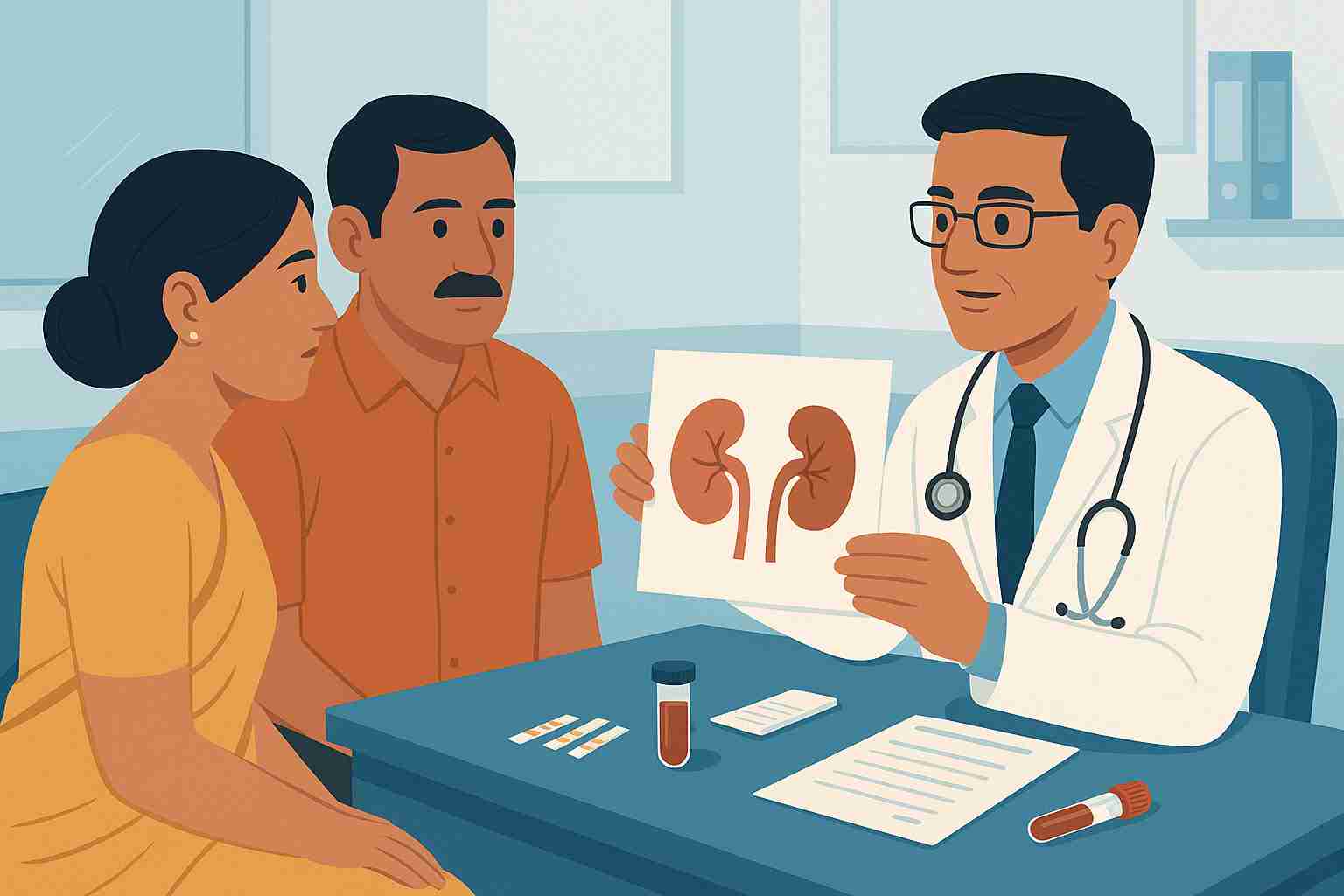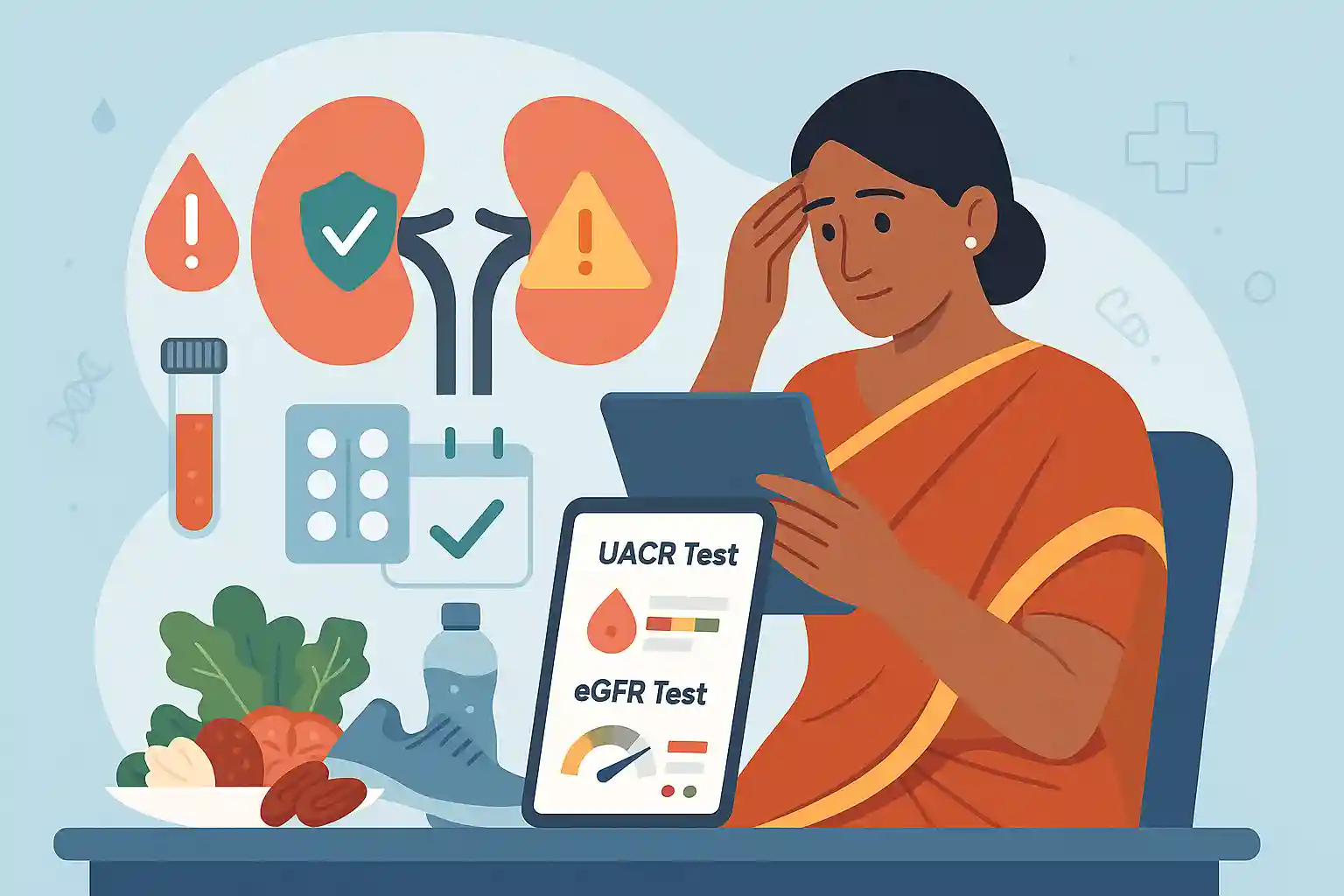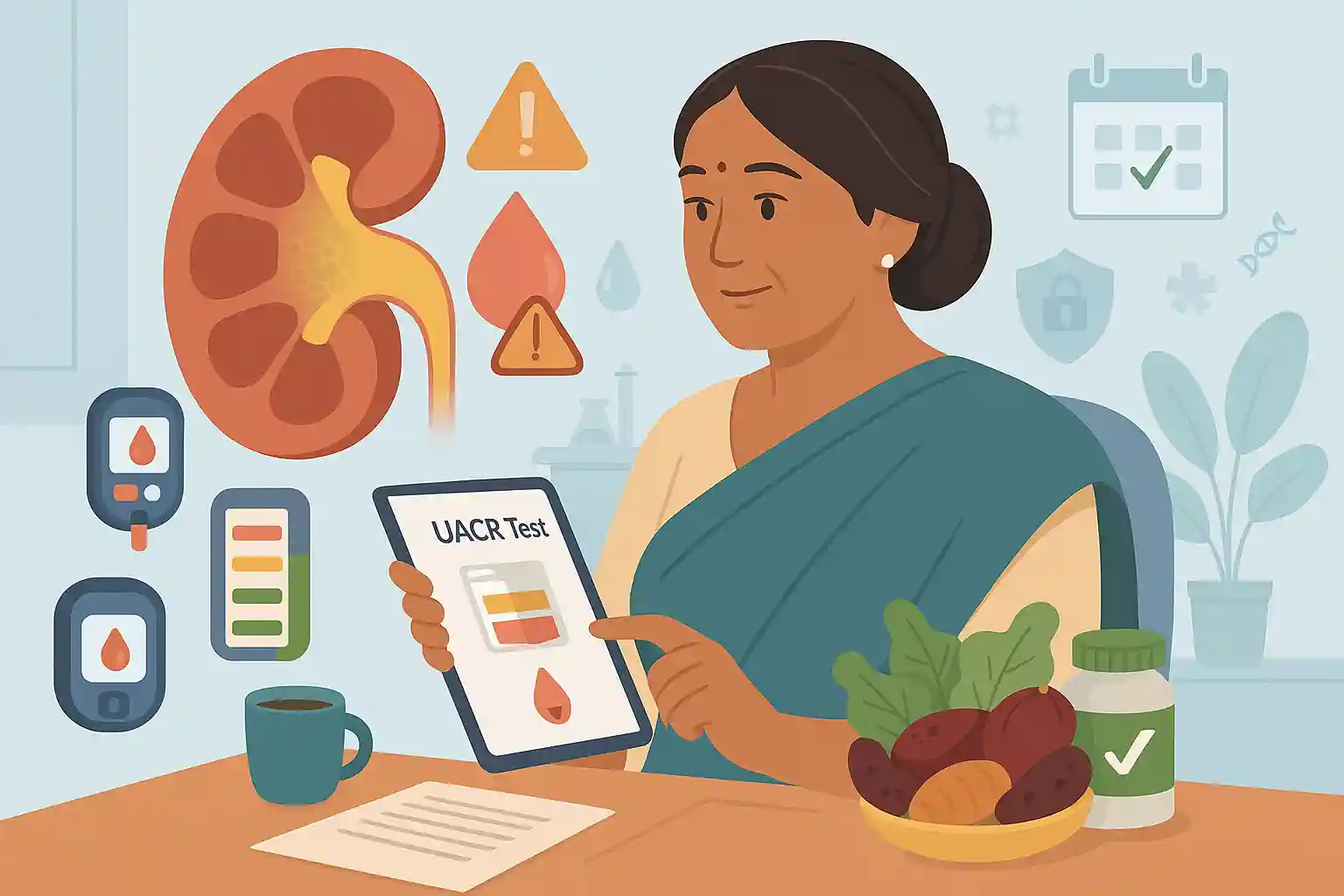Your kidneys are remarkable organs that work tirelessly, filtering waste and excess fluid from your blood 24/7. Yet chronic kidney disease (CKD) is often called a 'silent killer' because it can progress for years without obvious symptoms. By the time most people notice something is wrong, significant and often irreversible damage has already occurred. Understanding how to detect kidney problems early can be the difference between manageable treatment and life-threatening complications.
Why Kidney Disease Stays Hidden
The kidneys have an extraordinary ability to compensate for damage. Even when functioning at just 30-40% of normal capacity, they can still maintain relatively normal blood chemistry levels, masking the underlying problem.
Reasons kidney damage goes unnoticed:
- Kidneys have tremendous reserve capacity—you can function normally with just one healthy kidney
- Early symptoms are often vague and attributed to other causes (fatigue, sleep problems)
- The progression is typically gradual, allowing the body to adapt slowly
- Many people don't get regular health screenings that include kidney function tests
- Risk factors like diabetes and high blood pressure may be poorly controlled
- Kidney function naturally declines with age, making early changes seem normal
Understanding Kidney Function Stages
Chronic kidney disease is classified into five stages based on estimated glomerular filtration rate (eGFR), which measures how well your kidneys filter blood:
- Stage 1 (eGFR ≥90): Normal or high function with kidney damage present
- Stage 2 (eGFR 60-89): Mild decrease in function with kidney damage
- Stage 3a (eGFR 45-59): Mild to moderate decrease in function
- Stage 3b (eGFR 30-44): Moderate to severe decrease in function
- Stage 4 (eGFR 15-29): Severe decrease in function
- Stage 5 (eGFR <15): Kidney failure requiring dialysis or transplant
Most people don't experience symptoms until stages 3-4, when 50-85% of kidney function has already been lost.
Subtle Early Warning Signs
While kidney disease is often silent, some early signs may appear that are frequently overlooked or attributed to other causes:
Physical Changes:
- Persistent fatigue and weakness that doesn't improve with rest
- Difficulty concentrating or mental fogginess
- Poor appetite or nausea, especially in the morning
- Sleep problems, including insomnia or restless legs
- Muscle cramps, particularly at night
- Dry, itchy skin that doesn't respond to moisturizers
Urination Changes:
- Foamy or bubbly urine that doesn't dissipate (may indicate protein)
- Changes in urination frequency, especially increased nighttime urination
- Difficulty starting urination or weak stream
- Blood in urine (even if intermittent)
- Persistent cloudiness or unusual odor
- Reduced urine output despite normal fluid intake
Fluid-Related Signs:
- Swelling in feet, ankles, or legs, especially at the end of the day
- Puffiness around the eyes, particularly in the morning
- Unexplained weight gain from fluid retention
- Shortness of breath during normal activities
- High blood pressure that's difficult to control
Who Should Be Screened
Early detection is crucial for anyone at risk of kidney disease. Regular screening is essential for:
High-Risk Groups:
- People with diabetes (type 1 or type 2)
- Those with high blood pressure (hypertension)
- Family history of kidney disease
- Age 60 or older
- History of cardiovascular disease
- Obesity (BMI ≥30)
- Autoimmune diseases (lupus, rheumatoid arthritis)
Additional Risk Factors:
- Long-term use of NSAIDs (ibuprofen, naproxen)
- History of acute kidney injury
- Certain ethnic backgrounds (African American, Hispanic, Native American, Asian)
- Smoking or tobacco use
- History of kidney stones or urinary tract infections
- Exposure to certain medications or toxins
Essential Screening Tests
Early detection of kidney disease relies on simple, accessible tests that can reveal problems before symptoms appear:
Blood Tests:
- Serum creatinine: Measures waste product levels; elevated levels suggest reduced kidney function
- Estimated GFR (eGFR): Calculated from creatinine, age, sex, and race to estimate kidney function percentage
- Blood urea nitrogen (BUN): Another waste product that accumulates when kidneys aren't working properly
- Electrolytes: Sodium, potassium, phosphorus levels that kidneys help regulate
Urine Tests:
- Urinalysis: Checks for protein, blood, glucose, and other abnormalities
- Albumin-to-creatinine ratio (ACR): Measures protein leakage, an early sign of kidney damage
- 24-hour urine collection: Provides comprehensive assessment of kidney function
- Urine microscopy: Examines cells, casts, and crystals that may indicate kidney problems
Additional Tests When Needed:
- Kidney ultrasound: Visualizes kidney size, structure, and blood flow
- CT or MRI scans: Detailed imaging for suspected structural problems
- Kidney biopsy: Tissue sample analysis for diagnosis of specific kidney diseases
- Cystatin C: Alternative blood test for kidney function, especially useful in certain populations
When and How Often to Get Tested
Screening frequency depends on your risk factors and current health status:
Low Risk (No Risk Factors):
- Annual screening starting at age 50
- Basic metabolic panel including creatinine
- Urinalysis during routine physical exams
Moderate Risk (1-2 Risk Factors):
- Annual comprehensive kidney function testing
- Include eGFR and urine albumin measurements
- Start screening earlier if family history present
High Risk (Diabetes, Hypertension, or Multiple Risk Factors):
- Every 6 months: Complete kidney function panel
- Quarterly if diabetes is poorly controlled
- Monitor closely during medication changes
- Annual specialist consultation recommended
Understanding Your Test Results
Knowing how to interpret kidney function tests helps you understand your health status:
eGFR (Estimated Glomerular Filtration Rate):
- 90 or higher: Normal kidney function
- 60-89: Mild decrease (may be normal for age)
- 45-59: Mild to moderate decrease
- 30-44: Moderate to severe decrease
- 15-29: Severe decrease
- Below 15: Kidney failure
Urine Albumin Levels:
- Less than 30 mg/g: Normal
- 30-300 mg/g: Moderately increased (microalbuminuria)
- Over 300 mg/g: Severely increased (macroalbuminuria)
- Persistent protein in urine is always concerning
Important: A single abnormal test doesn't necessarily indicate kidney disease. Results should be confirmed with repeat testing and evaluated by healthcare professionals.
Prevention Strategies
The best approach to kidney disease is prevention. Many risk factors can be controlled through lifestyle modifications:
Blood Sugar Control:
- Maintain HbA1c below 7% if diabetic (as recommended by your doctor)
- Follow consistent meal timing and carbohydrate counting
- Monitor blood glucose regularly
- Take medications as prescribed
- Work with diabetes educator for optimal management
Blood Pressure Management:
- Target blood pressure below 130/80 mmHg (or as directed by your doctor)
- Limit sodium intake to less than 2,300 mg daily
- Maintain healthy weight through diet and exercise
- Take prescribed blood pressure medications consistently
- Monitor blood pressure regularly at home
Lifestyle Modifications:
- Stay adequately hydrated (8-10 glasses of water daily)
- Exercise regularly (150 minutes moderate activity weekly)
- Maintain healthy weight (BMI 18.5-24.9)
- Quit smoking and limit alcohol consumption
- Follow heart-healthy diet rich in fruits and vegetables
- Limit processed foods and excessive protein intake
Medication Safety:
- Use NSAIDs sparingly and only as directed
- Inform all healthcare providers about kidney concerns
- Review medications regularly with pharmacist or doctor
- Avoid supplements and herbs without medical approval
- Be cautious with contrast dyes used in medical imaging
When to See a Specialist
Early referral to a nephrologist (kidney specialist) can significantly improve outcomes:
Immediate Referral Needed:
- eGFR below 30 (stage 4 kidney disease)
- Rapid decline in kidney function (>25% drop in eGFR within a year)
- Persistent protein in urine despite treatment
- Blood in urine without clear cause
- Difficult-to-control blood pressure with multiple medications
- Symptoms of advanced kidney disease
Consider Specialist Consultation:
- eGFR 30-44 (stage 3b kidney disease)
- Progressive kidney function decline
- Unclear cause of kidney disease
- Complex medical conditions affecting kidneys
- Need for advanced treatment planning
- Family history of genetic kidney disease
Living with Early-Stage Kidney Disease
Receiving a diagnosis of early kidney disease can be overwhelming, but early detection provides opportunities for intervention:
Immediate Steps:
- Work closely with healthcare team to understand your condition
- Optimize control of diabetes and blood pressure
- Review all medications and supplements with your doctor
- Make necessary dietary and lifestyle changes
- Establish regular monitoring schedule
- Learn about your condition and treatment options
Long-term Management:
- Attend all scheduled appointments and monitoring
- Keep detailed records of symptoms and test results
- Maintain open communication with healthcare providers
- Join support groups or educational programs
- Plan for potential future treatments if needed
- Focus on overall health and quality of life
The Hope in Early Detection
While kidney disease progression cannot always be stopped, early detection opens doors to interventions that can significantly slow its advancement. Many people with early-stage kidney disease live full, active lives for decades with proper management.
Research continues to advance our understanding of kidney disease, leading to new treatments and better outcomes. By catching kidney problems early, you're giving yourself the best chance to maintain kidney function and overall health for years to come.
Remember, your kidneys work silently, but you don't have to wait for symptoms to protect them. Regular screening, healthy lifestyle choices, and proactive medical care are your best defenses against silent kidney damage. Take charge of your kidney health today—your future self will thank you.
References
- https://www.kidney.org/atoz/content/about-chronic-kidney-disease
- https://www.niddk.nih.gov/health-information/kidney-disease/chronic-kidney-disease-ckd
- https://kdigo.org/guidelines/
- https://www.cdc.gov/chronic-kidney-disease/about/facts.html
- https://www.kidney.org.uk/kidney-health-information/kidney-conditions
- https://www.nephron.com/chronic-kidney-disease
- https://www.nih.gov/news-events/nih-research-matters/early-intervention-may-slow-kidney-disease
- https://www.ajkd.org/article/S0272-6386(20)30535-7/fulltext30535-7/fulltext)
- https://jasn.asnjournals.org/content/early/2019/10/03/ASN.2019050488



